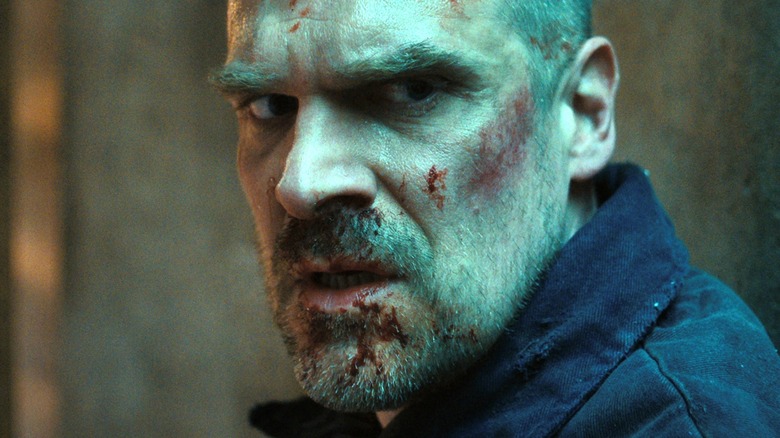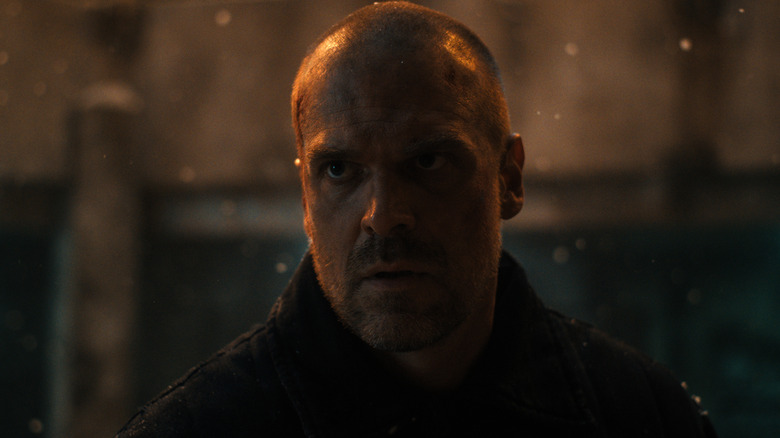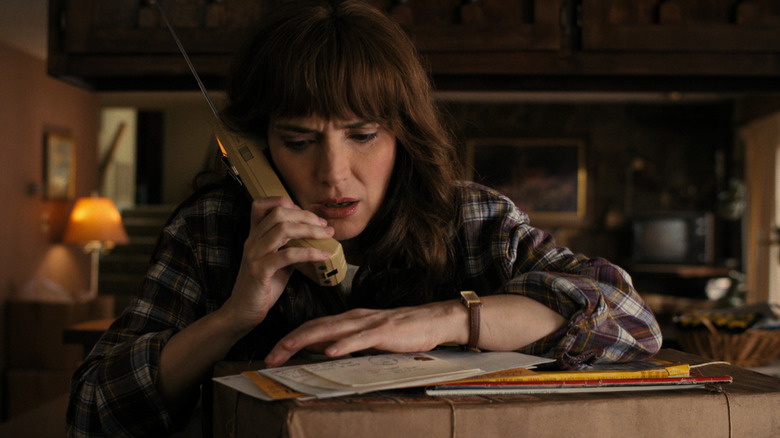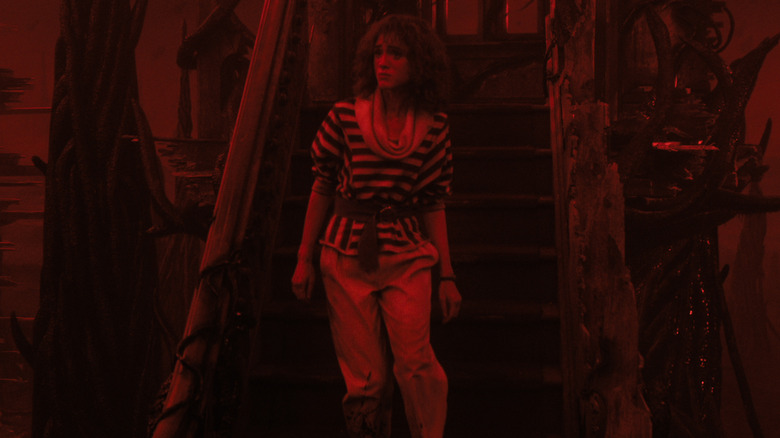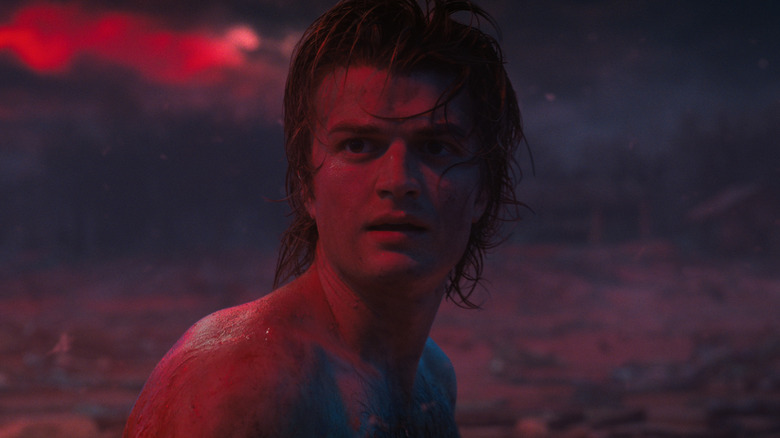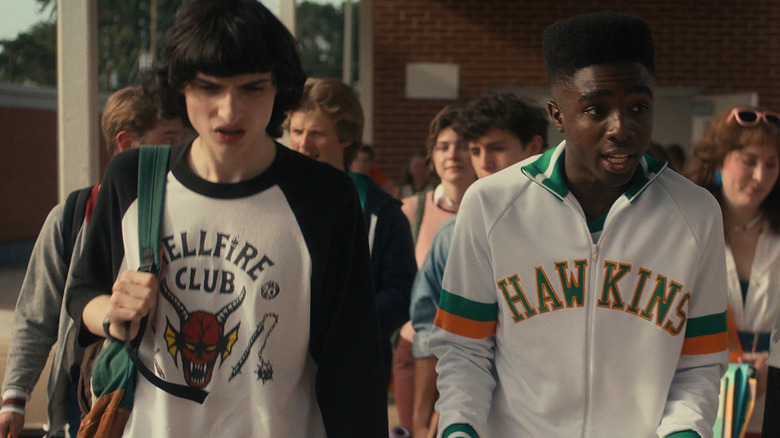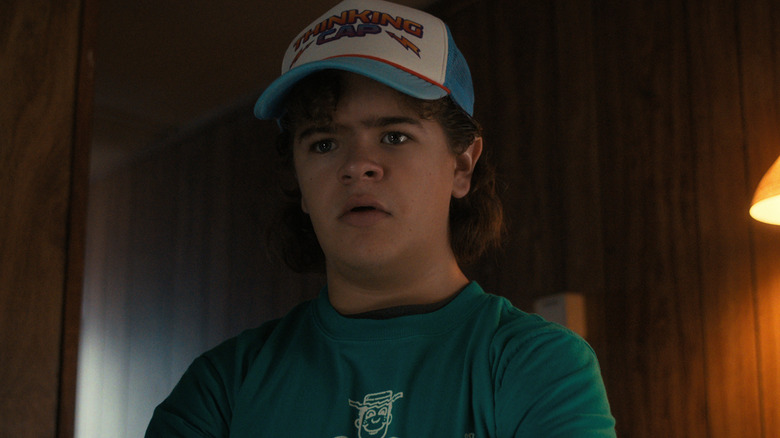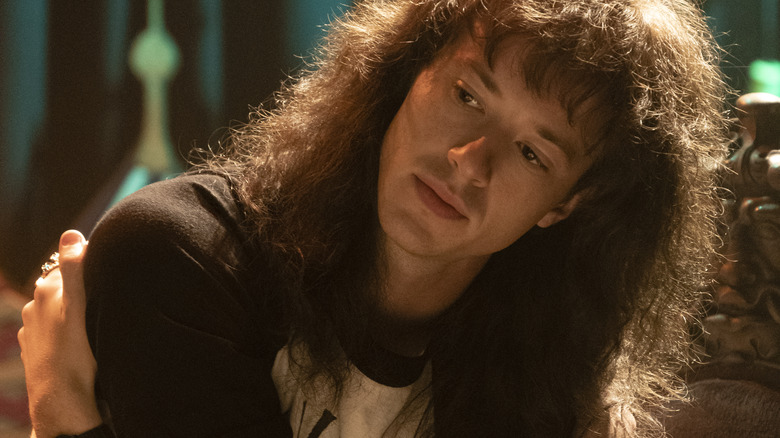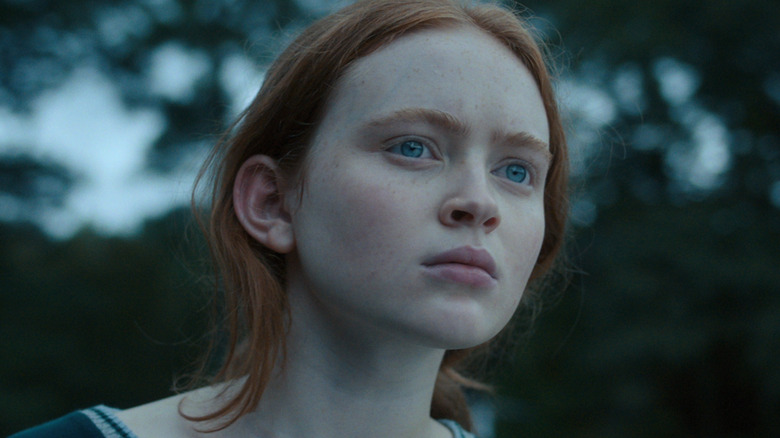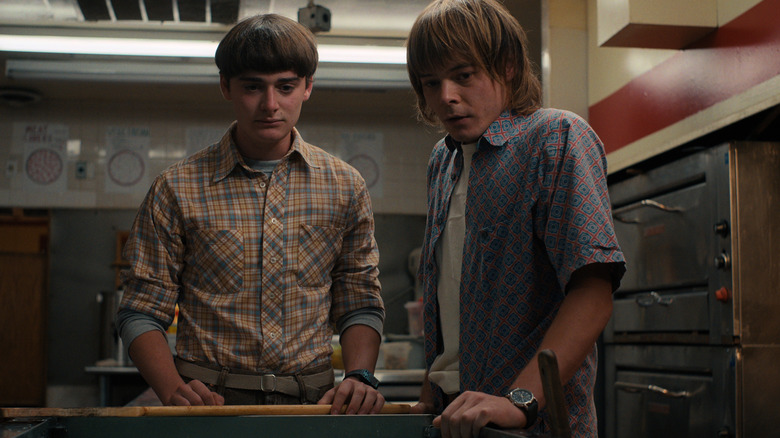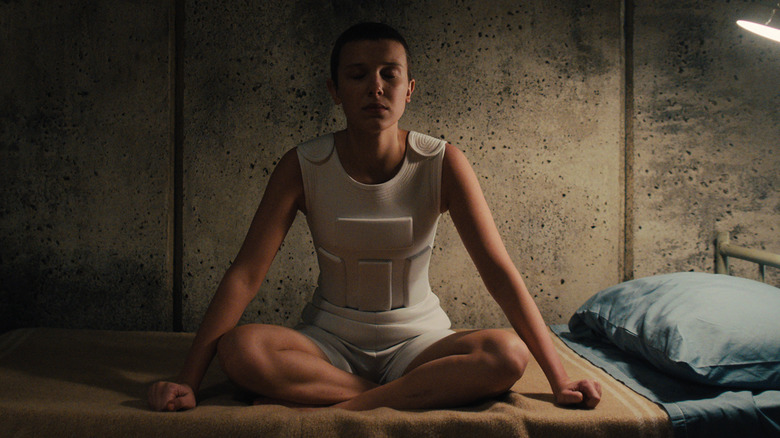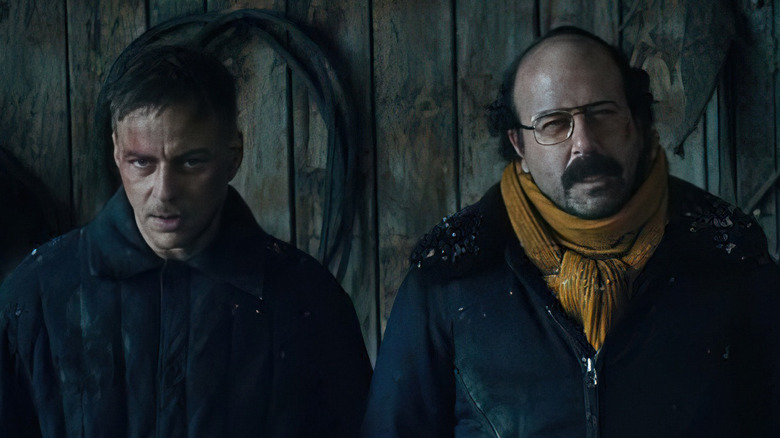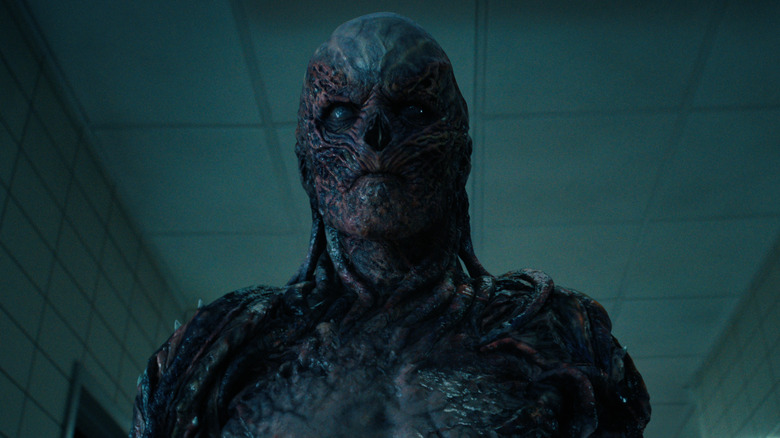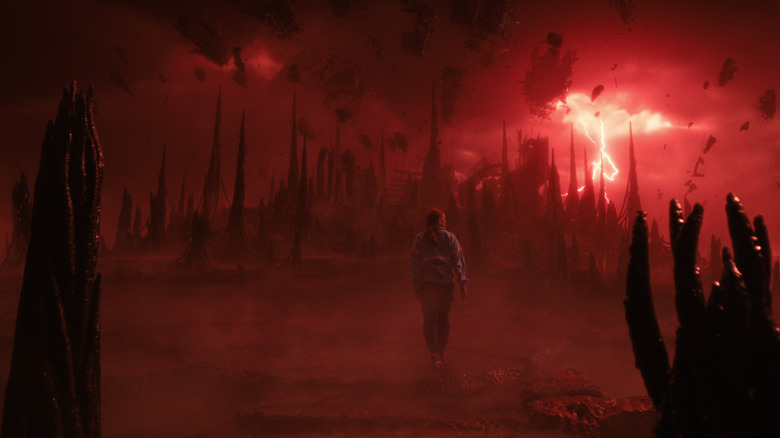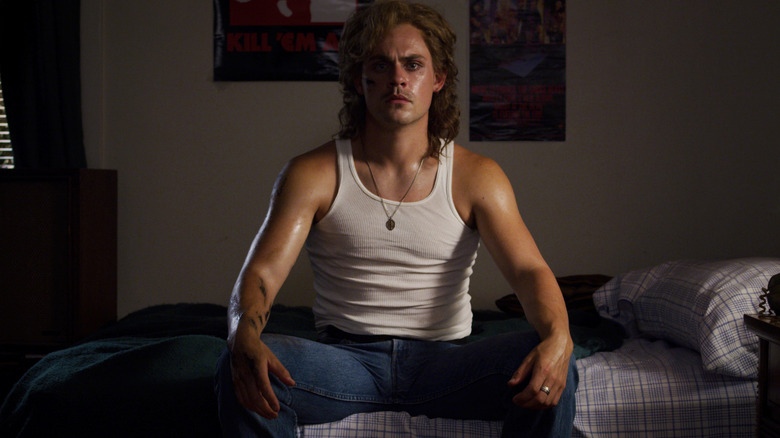Stranger Things Characters Ranked By Their Dungeons And Dragons Alignments
One main theme that the Duffer Brothers' Netflix series "Stranger Things" consistently brings fans back to is the connection to the cult classic roleplaying game Dungeons & Dragons. From the very beginning, the younger characters' enthusiasm for D&D is reflected by their lives in Hawkins, and the iconic game is heavily represented throughout the series.
In honor of the huge inspiration D&D has had on "Stranger Things," we are inspecting the most significant characters in the series and ranking them by their moral alignments. Each of the nine D&D alignments reflects a particular character's ethos and motivations, ranging from "Lawful Good" to "Chaotic Evil." Some leeway has been given to the characters since the world in which "Stranger Things" takes place is one that combines fantasy with reality, but each character can comfortably find a home within their perspective alignment.
This article contains spoilers for all seasons of "Stranger Things," so if you are not all caught up, read at your own peril.
Lawful Good: Jim Hopper
Jim Hopper might be an officer of the law, but that certainly is not what earns him the Lawful Good moral alignment. Starting from his inspection of the Hawkins Lab in Season 1, Hopper gradually transforms from the sheriff into a different kind of protector. He must adapt to the wild circumstances presented by the Upside Down, so he breaks away from the laws he has sworn to uphold and forms his own sort of moral ethics and rules that he follows in the new world he finds himself in.
These laws he has internalized and created are meant to protect the people he loves: Joyce, Eleven, and the rest of the crew that have joined him in the fight against evil. While he may get confused for a Chaotic Good character due to his willingness to go to extreme lengths to keep his found family safe — like beating up the mayor or punching a mortician — the fact that these actions stem from his own self-governed laws and his own morality makes his actions necessary and, more pertinently, lawful ... in a manner of speaking.
Hopper's status as police chief may not be the deciding factor of his alignment, but his position is evidence that he would have potentially still been a Lawful Good character even if Hawkins hadn't ended up so strange.
Lawful Good: Joyce Byers
Joyce is very similar to Hopper in that she acts on behalf of the people she loves, which stems from a strict set of laws she holds within herself. She, quite literally, goes to the ends of the Earth to save the people she cares about — delving into The Upside Down for her son Will and then into a secret Russian prison for Hopper. While there are certainly some government laws broken here and there in the process of all this heroism, Joyce remains true to her own personal system of justice.
Also like Hopper, Joyce has some chaotic good characteristics, as she doesn't really mind who she goes up against or what rules she stomps on in order to fulfill her personal sense of duty. The character is so like that of Hopper that fans have definitely noticed a correlation between the two. Joyce and Hopper are, in a lot of ways, each other's true counterpart and act as each other's defender.
The Lawful Good Dungeons & Dragons alignment is also referred to in "Dungeons & Dragons 3.5 Player's Handbook," as "The Crusader," which describes Joyce very accurately. Though she comes off as an over-worried and frantic mom to some, especially in the earlier seasons of "Stranger Things," she actually is one of the first people to notice something is very wrong in Hawkins and stays vigilant in the fight against supernatural malevolence.
Lawful Good: Nancy Wheeler
Lawful good is the most moral alignment a character can have; for someone as young as Nancy to obtain it is quite impressive. She absolutely fits the description of a Dungeons & Dragons Crusader throughout the series, even during missions that the other main characters are not focused on or even remotely interested in.
First, she's dedicated to her mission to save Barb, whose disappearance is largely ignored by the other characters who are much more focused on finding Will Byers. Even after the discouraging and tragic conclusion to the search for Barb, Nancy stays vigilant and honors her departed friend. In Season 3, Nancy becomes a champion for herself and women in the workplace, which isn't on practically anyone else's radar. Even her boyfriend Jonathan, who sees firsthand how she's treated in their shared workplace, doesn't seem to register that they're being subjected to double standards. Nancy takes a leadership position in Season 4, leading the Hawkins group of heroes into the Upside Down in the hunt for usable weapons and has zero hesitation when it comes to diving into danger to save Steve.
Even though she is one of many characters on the right side of the fight against evil in Hawkins, Nancy has become a fan favorite due to what an unexpectedly righteous butt-kicker she turns out to be over the course of "Stranger Things." Nancy being the only youth in the series to land the Lawful Good alignment only adds to her level of badassery.
Neutral Good: Steve Harrington
In terms of morality, Steve has a rough start of things at the beginning of "Stranger Things," but he evolves into a character we can confidently characterize as good. If we ignore the majority of Season 1, Steve famously plays mother hen to the original five stranger kids, who are all a few years his junior. His role within the group is one that fans have latched onto and heavily support, but it is also what earns him the Neutral Good alignment.
As the self-assigned protector to the younger members of the group, Steve consistently puts himself in the face of danger before the others. He is the one who steps up to defend his younger friends, which ends up getting him seriously beat up a number of times throughout the series. As Dustin hilariously points out, Steve's subpar fighting skills don't do him any favors.
Dungeons & Dragons coins the Neutral Good alignment as "The Benefactor," which aptly describes Steve. He, above all else, fights for the safety of his "wards" and is willing to work with other higher powers on the side of good but won't hesitate to take the lead whenever necessary.
Neutral Good: Mike Wheeler and Lucas Sinclair
These two OG "Stranger Things" main characters both secure the Neutral Good alignment for their constant willingness to fight on the side of good, even when they are going through rough patches with their team members. Both characters are loyal to their friends, and both can be self-sacrificing when it really comes down to the wire for the ones that have stolen their hearts.
Lucas makes his alignment solidly known in Season 4 when he's willing to sacrifice himself to give Max more of a fighting chance against Vecna. "He almost died," Lucas' actor Caleb McLaughlin told IndieWire when speaking about his character's fight scene in Season 4, Episode 9. "But then he saw Max levitating and he was like, 'Aw no, I gotta get this man up off me.'"
As for Mike, he has also been willing to lay his life on the line for Eleven, telling Dr. Brenner that he would have to kill him in order to get to her in Season 1, and then stepping in front of Eleven when a possessed Billy Hargrove wants to kill her in Season 3. Mike is also willing to potentially sacrifice himself — or get hurt, at least — for Dustin in Season 1, when a bully threatens Dustin with a knife to the throat if Mike doesn't jump from the top of a quarry.
Chaotic Good: Dustin Henderson
Dustin has a good, pure heart and a free and rebellious spirit. He fights against evil alongside his friends and allies, yet he tows the line of rule breaker more than the average "Stranger Things" crew member. This is exemplified by the fact that he keeps his baby demogorgon a secret from his friends for longer than he probably should in Season 2. His penchant for cursing after Season 1 and the way that he wears a loud, colorful button-up over his Hellfire Club shirt in Season 4 both reflect his habitual lean toward rebellion and non-uniformity.
Out of all the gang, Dustin is the most nonconforming. In Season 3, he separates from the group and does his own thing — goes to space camp — over the summer. He also branches out and builds strong relationships with other non-group members, most notably his tight bonds with both Eddie and, in Season 2, Steve.
Though he will likely never veer from having a good alignment, we may see a shift in his exact alignment in Season 5. "We don't necessarily see it happen," Gaten Matarazzo, the actor who plays Dustin, told TVInsider. "But Dustin would've had to have left [Eddie] there to get out and leave himself." After witnessing the brutal killing of someone he deeply cared about and having to then abandon his body, Dustin could see a drastic change in his personality after such a traumatic event.
Chaotic Good: Eddie Munson
Eddie Munson starts out as a Chaotic Neutral character when he enters the series in Season 4. However, he very quickly shifts to fall under the Chaotic Good alignment, arguably in that same introductory episode. Eddie's first couple scenes paint him as an eccentric, rough-around-the-edges character who may even be a little bullyish to those below him in the social hierarchy of his circle. After his first on-screen interaction with Chrissy, though, viewers are met with a different version of Eddie. Despite clearly being what the Dungeons and Dragons Guidebook would describe as "The Rebel," he exudes a vibe that indicates when the proverbial chips are down, Eddie's actually a decent guy.
His aggressive character arc and development made fans fall in love with the chaotic and endearing character, and a lot of fans are questioning whether or not he really had to die. His self-sacrifice at the end of Season 4 is heartbreaking and meaningful, but it's also rash and arguably unnecessary since we really don't know how much it helps the rest of the group survive. Eddie's heart was in the right place, but he may have been just a little too chaotic in his decision to sacrifice himself. We still Stan a Chaotic Good king, though.
Chaotic Good: Max Mayfield
Max went through quite the transformation in Season 4, and we are left wondering where she'll be at in Season 5. However, when looking at a character analysis of Max, it's clear she has always been of the Chaotic Good alignment, even at the beginning of Season 4 when she's shutting out those closest to her. The simple fact that she feels such immense guilt over the death of Billy — who terrorized, abused, and ostracized her — speaks to her undeniably good nature.
Her chaotic tendencies may also come from growing up with Billy. We first really see her largely chaotic nature when she threatens him with a barbed-wire-wrapped bat to the genitals right after he beats Steve to a pulp and threatens her newfound family. We continue to see this in her when she is willing to act as bait for Vecna in Season 4, and her all-around reaction to being the next in line for Vecna's mind-flaying trip of terror. She shows a wild amount of bravery, and in what she fully expects to be her last day alive, she tries to leave the world better for those she loves in her absence.
True Neutral: Jonathan and Will Byers
If any main characters maintain any sort of true neutral territory, it would be the Byers brothers. Sure, they fight on the side of good as long as Will isn't possessed, but when you compare them to their friends, they are found slightly lacking in their dedication to good morality.
Season 4 is the only season we see a "normal" Will where he has zero influence from the Upside Down, yet he is still found lacking in his ethics. While we only see a small look into his and Eleven's school life, it appears as though he has stood idly by while she has been intensely bullied all year at their new school. Not only does Will not step in to defend her, which all the other "Stranger Things" kids absolutely would have done, but he also gets upset at her, the victim, for being embarrassed and hiding her mistreatment from Mike.
(Granted, considering the intensity of 1980s homophobia and Will's conflicted feelings about Eleven's relationship with Mike, it's not too hard to understand Will's hesitancy to hurl himself between Eleven and a rampaging hoard of merciless high school bullies. But despite the valid reasons for Will's inaction, the fact remains that he could have helped out more.)
As for Jonathan, he absolutely shows a loyalty and desire to protect Will, but he is seemingly more neutral leaning when it comes to everyone else, especially when you look at the lengths other members of the "Stranger Things" gang go to for each other to ensure the safety of Hawkins. Jonathan is a downright hindrance to Nancy in Season 3 when he seems more concerned about keeping his new job than investigating the literal evil he already knows exists in Hawkins. He is also somewhat disconnected in Season 4.
Chaotic Neutral: Eleven/Jane Hopper
From her psychic powers to her complete disregard for traditional rules, Eleven is certainly chaotic. She can't really be blamed for being raised in a lab full of kids with special mind powers, but she has taken her untraditional upbringing and turned it into a way to defend her friends by any means necessary, including leaving bodies in her wake.
Eleven has remained on the side of good, but she has likely taken more lives than anyone else on the same side. In fact, viewers are starting to speculate if Eleven is going to turn into a villain in the final season of "Stranger Things." Season 4 reveals that Eleven has quite a bit to do with the creation of Vecna, even though she doesn't turn out to be the mass killer viewers are led to think in the opening scene of the same season.
Eleven-slash-Jane, a "Free Spirit" according to the Dungeons & Dragons description of Chaotic Neutral characters, puts great importance on her freedom and personal choice, considering the unique circumstances in which she was raised. She has a soft spot for some of those who fall under the evil alignments, but her relationship with her found family keeps her actions more aligned with the good side of morality. Even so, she earns a neutral ranking due to her dualistic personality.
Chaotic Neutral: Murray Bauman and Dmitri Enzo Antonov
Both Murray and Dmitri have ended up helping the good guys, but their choices to do so have had more to do with themselves than any high-minded moral inclination. They are individuals before anything else, even if they do have good tendencies.
Dmitri helps Hopper after he earns his respect, but he's ultimately motivated by money and his own need to escape his situation. His reaching out to Joyce helps Hopper escape, but Dmitri's motivations are selfish and driven by cash. Like Eddie Munson, Dmitri amassed a fan following by the end of Season 4, and for all we know, we could always see some growth from him in the last season of "Stranger Things."
Murray, on the other hand, has been around for a while and just seems to be getting better as time goes on. He, as an immensely helpful character to the central group, leans a little harder towards good than Dmitri, but it also wouldn't be too surprising if he went against the group if doing so served his own self-interest. It seems very unlikely he would go evil, though, as there's nothing in his self-interest about the Upside Down.
Lawful Evil: Vecna
At first glance, Vecna appears to be absolutely chaotic. He is a man-shaped monster with tentacles on his face who bends limbs backwards and pokes out eyes from the inside of his victim's minds; it's admittedly pretty wild. When you look at him at a base level, though, Vecna is actually very lawful in the way he operates.
Vecna is an incredibly powerful force, so how could a group of teenagers defeat him? They manage to figure out exactly how his attacks work, and they couldn't do that if he didn't follow a strict set of rules with each murderous gesture. He is practically made up of rules — from the people he chooses as his victims to how he breaks them down. He only goes after individuals who feel an immense internal guilt, and he goes through the same routine each time he torments them until their doom in the Upside Down.
The villain is straight out of Dungeons & Dragons and even shares some traits with the game's similarly named character. If Vecna was a chaotic villain, he might've been able to successfully kill everybody during Season 4 of "Stranger Things."
Neutral Evil: The Upside Down
Although certainly more of a setting than a character, the Upside Down shares some traits of a living, breathing character. Fans saw in Season 4 that the parallel world can change and shift depending on who is ruling the land. So, although the Upside Down is a truly terrifying version of Hawkins, it's actually just following its nature. The leader of the world is evil, so it becomes evil. If you take out the forces of evil that are under the control of Vecna and always seem to travel in packs, you're left with a relatively empty world that just so happens to be just a little bit toxic. According to Millie Bobby Brown in an interview with Variety, the Upside Down seemingly existed before Vecna, and could have been completely different. "I think that the alternate universe was always there," she tells the news source. "That is always going to be under Hawkins."
It goes to reason that if a new, unbiased ruler is powerful enough to take over the Upside Down and assert their influence, or if it is just left to completely neutralize itself without a leader at all, that the parallel world would lose its evil properties and become truly neutral rather than evil. For the purpose of this article, though, we are sticking with the Upside Down we see attacking the very lovable characters of Hawkins and giving the deadly place an evil alignment.
Chaotic Evil: Billy Hargrove
Billy Hargrove is a wild card before he gets possessed by the Mind Flayer, but after that he turns into something truly terrifying and seemingly unstoppable. Although we have already established that neither Vecna nor the Upside Down is actually chaotic at their core, Billy Hargrove is from the start and the addition of a possession didn't change that too much, even if it did give his chaos a purposeful mission.
Billy is always a mean character, even if he does end up having a redemption at the end of Season 3 by sacrificing himself to save Eleven. He was an abusive and, as explicitly pointed out by series star Caleb McLaughlin to IndieWire, racist character who was driven by hate — no matter if that hate grew out of sadness and loss. For these reasons, he is practically the only character that can be aligned with "The Destroyer," as from what we see in "Stranger Things," that is all he ever does.
